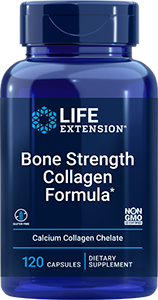
Why Supplement with Collagen?
Published: July 2022
You already know what protein is. It’s not just beneficial for your body—it’s necessary for your survival! But did you know that you have different types of protein in your body? One such type is collagen. Collagen is a kind of protein particularly important for making connective tissue and is a big part of our bones, skin, tendons, cartilage and muscles. In order for these tissues to stay strong and flexible, they need collagen.
Where do we get our collagen from? Well, our bodies make some of it, but this declines as we age, starting for women with menopause, when changes in estrogen can impact collagen levels. And of course, among the elderly, it’s common for bones to need more support. (Other factors like lack of sun exposure and poor lifestyle choices can impact collagen levels, too.)
Certain foods contain collagen—namely, meat. And other foods have components that help with collagen production. This is why some people drink bone broth. Bone broth contains a lot of those vital nutrients since it’s made by brewing animal bones and tissues, so it’s very collagen-rich.
Indeed, you can get some of your collagen from your diet, but it may not be enough. And if you follow a plant-based diet, supplements become even more important since these diets aren’t often high-protein.
So, you can probably see why collagen supplementation matters—especially as we age. But what do these dietary supplements do, exactly? How do they work? Let’s dive into the nitty-gritty!
What are collagen supplements?
First, let’s talk about where exactly your collagen supplements come from. Collagen supplements are usually made from animal tissue since that’s one of the biggest outside sources we have. They’re often taken orally and frequently come in capsule or powder form, as these are best absorbed by the human body.
“Collagen” is an umbrella term that encompasses many different types. Two of the more common forms used for supplementation are collagen peptides and hydrolyzed collagen. These two types are more broken down, so your body can better utilize them.
As you can probably guess, not all collagen supplements are created equal. More on this later!
How do collagen supplements work?
Here’s how it works: Collagen supplements are formulated with amino acids. Amino acids combine to make protein. And protein (along with amino acids) is one of the building blocks of life.
For an added boost, many of these supplements are also formulated with additional nutrients like biotin and zinc. Both of these nutrients also play a huge role in healthy hair, skin and nails. It’s an excellent way to get the nourishment you need in a single supplement.
Health benefits of collagen supplements: Are they good for you?
We’ve touched on this a little bit already. Primarily, the main health benefit of collagen supplements is extra support for skin health. Collagen production is a vital part of your skin and helps to make it strong and resilient. This is why people take it to stay youthful and incorporate it daily into their skin care routines! Plus, it’s great for your bones, hair and nails. It’s not all about aesthetics. Collagen benefits your health inside and out.
Let’s get into this a little bit more and see what science says.
Skin health
Science agrees that collagen can help your skin stay young and supple. One review of 11 studies with a combined 805 participants found that oral collagen supplements supported healthy skin. It supported skin elasticity, hydration and collagen density.
Another clinical trial involved 60 healthy females between the ages of 40 and 50 showed that topical collagen peptides prompted significantly increased water content and elasticity in the skin, which can provide a more youthful appearance. (Increased water content means better skin hydration. This can make the skin look plump.)
And yet another study of 69 women between the ages of 35 and 55 found a major improvement in skin elasticity after eight weeks of using daily hydrolyzed collagen, compared with the placebo group. Elasticity is something that declines as we age, and collagen can be one way to combat that.
Hair and nails
If you want gorgeous locks and strong nails, you’re in luck. A clinical study using bioactive collagen peptides showed that this type of collagen helped to maintain nail growth rate.
Joint health
If your joints remind you of their presence every time you get out of bed, collagen might be able to help! One six-month, randomized study with 250 participants found that taking collagen hydrolysate daily helped to significantly encourage knee comfort, specifically. Try taking collagen to promote joint health.
Bone health
Similarly, your bone health might benefit from collagen, and this is going to become more necessary as you collect birthdays. One clinical study of 39 women taking calcium, vitamin D and calcium-collagen chelate showed that those who took collagen had maintained healthy bone mineral density. If your collagen production declines over the years, keep your bones strong with a calcium-collagen supplement.
Explore Our Best Skin Care Products
Which form of collagen is most effective?
Just like there are different types of protein, there are also different types of collagen. In total, there are 28 kinds of collagen. The most common are Types I, II, III and IV. In fact, Type I comprises more than 90% of the collagen in your body, found in your bones, skin, teeth, tendons and ligaments. Type I is also what’s usually considered the best for your skin, as it makes up about 80% of it. Type II makes up about 80% of your cartilage and connective tissue. This is why some people take collagen II supplements to promote bone and joint health. Type III makes up about 15% of the collagen in your skin, and it’s also in your lung, liver and spleen tissues.
But what about when it comes to supplementation, specifically? What type of collagen should you take (since there are so many options)? We recommend looking for collagen peptides made with hydrolyzed collagen. Collagen is a bigger molecule, meaning that it’s going to be more challenging for your body to use it. Peptides are smaller portions that your body can more easily absorb and use. Bioactive collagen peptides stimulate the formation of collagen and elastin and also inhibit their breakdown. So, it can help keep your skin soft and elastic.
Best ways to take a collagen supplement
As we mentioned earlier, your body is best able to use collagen when you consume it. This means taking a collagen powder, capsule, or serum (using a dropper). You can even put it in your coffee and bake with it.
You can also use a facial cream with collagen, but adding an oral supplement to your skin care routine will ensure you’re nourishing your skin and joints from the inside out.
Are collagen supplements safe?
Yes, collagen supplements are generally safe and well-tolerated by most individuals, without any interactions. Certain studies looking at collagen have reported no adverse side effects.
However, before taking any supplement, it’s always a smart idea to speak with your healthcare provider! This will be especially beneficial for:
- Children
- Women who are pregnant or breastfeeding
- Anyone with pre-existing medical needs
Ask your doctor if side effects might occur given your current state of health.
How much collagen should a 50-year-old woman take?
Collagen is a great choice for women who are in their 50s—in fact, it’s a recommended anti-aging nutrient for women aged 40 and older. So how much should you take? First and foremost, you should follow the directions on the bottle and also listen to what your healthcare provider tells you. Studies suggest that roughly 2.5 to 10 g per day is the generally recommended range.
What to look for in a collagen supplement: Smart tips
When considering taking any supplement, there are a few things you should look out for.
1. High-quality nutrients
Any collagen formula should contain clinically-studied nutrients, and the dosages should be based on what was found to be effective in studies. Look for ingredients that are pure, responsibly sourced and non-GMO. If a brand isn’t transparent about this, then it might be a red flag.
2. Hydrolyzed collagen
As we mentioned, hydrolyzed collagen is easier for your body to absorb and use. This means that you’re able to get the most out of it. So, you should look for collagen supplements that are made with hydrolyzed collagen.
3. Added nutrients
If you want your collagen supplement to pack a big punch, then look for something with additional nutrients that support your needs and goals. For example, Gummy Science™ Youthful Collagen also contains hyaluronic acid—another nutrient that promotes younger-looking skin. (You might’ve come across this in the past as a topical serum!)
You might also benefit from a collagen product containing vitamin C. Vitamin C plays a role in the formation of collagen, as well as maintaining healthy cartilage, bones and teeth. It’s a great anti-aging supplement.
With solid nutrition (especially amino acid- and protein-rich foods) and healthy lifestyle habits, a high-quality collagen supplement can promote better wellness and keep you looking and feeling young.
References
- Benito-Ruiz P et al. “A randomized controlled trial on the efficacy and safety of a food ingredient, collagen hydrolysate, for improving joint comfort.” Int J Food Sci Nutr. February 2009. https://pubmed.ncbi.nlm.nih.gov/19212858/
- Choi FD et al. “Oral Collagen Supplementation: A Systematic Review of Dermatological Applications Journal of Drugs in Dermatology.” JDD. January 2019. https://pubmed.ncbi.nlm.nih.gov/30681787/
- Colón-Emeric CS Saag KG. “Osteoporotic fractures in older adults.” Best Pract Res Clin Rheumatol. March 2006. https://www.ncbi.nlm.nih.gov/pmc/articles/PMC1839833/
- Edgar S et al. “Effects of collagen-derived bioactive peptides and natural antioxidant compounds on proliferation and matrix protein synthesis by cultured normal human dermal fibroblasts.” Sci Rep. July 2018. https://pubmed.ncbi.nlm.nih.gov/29992983/
- Elam ML et al. “A calcium-collagen chelate dietary supplement attenuates bone loss in postmenopausal women with osteopenia: a randomized controlled trial.” J Med Food. October 2015.https://pubmed.ncbi.nlm.nih.gov/25314004/
- Hexsel D et al. “Oral supplementation with specific bioactive collagen peptides improves nail growth and reduces symptoms of brittle nails.” J Cosmet Dermatol. August 2017. https://pubmed.ncbi.nlm.nih.gov/28786550/
- León-López A et al. “Hydrolyzed Collagen-Sources and Applications.” Molecules. November 2019. https://www.ncbi.nlm.nih.gov/pmc/articles/PMC6891674/
- Maia Campos PMBG et al. “Topical application and oral supplementation of peptides in the improvement of skin viscoelasticity and density.” J Cosmet Dermatol. March 2019. https://pubmed.ncbi.nlm.nih.gov/30834689/
- Proksch E et al. “Oral supplementation of specific collagen peptides has beneficial effects on human skin physiology: a double-blind, placebo-controlled study.” Skin Pharmacol Physiol. August 2014. https://pubmed.ncbi.nlm.nih.gov/23949208/
- Wu, M et al. “Biochemistry, Collagen Synthesis.” StatPearls. September 2021. https://www.ncbi.nlm.nih.gov/books/NBK507709/








